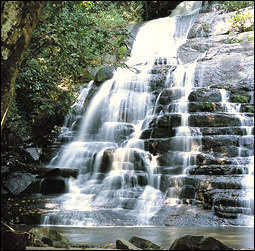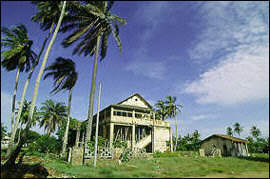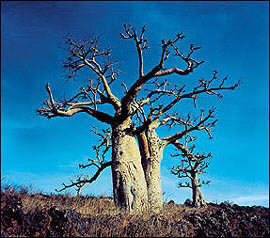 One million tourists expected by 2005 One million tourists expected by 2005 |

Tourism is one of the legs of the Elephant of Africa. From 156 000 tourists in 1993, 2 000 visitors came into Côte d'Ivoire in 1998. During the last Five-Year Plan in 1995 we expected the arrival of 500 000 tourists by the year 2000. The country is yet to reach to this goal. Côte d'Ivoire is replete with tourist potentials to enable the country play a major role in the subregion. The government intends to make Côte d'Ivoire a choice destination. In the past, tourism was not part of Government's priorities the same holds for Mining and Energy. The foremost priority was Agriculture. First of all, we are yet to adequately develop what we have and the missing linking is indaquate promotion of Côte d'Ivoire as a tourist destination. We need to publicise the country in the tourist world ", says Mr Affi N'Guessan, Minister of Tourism.
In 1980,Côte d'Ivoire received 302 000 tourists. " The figure fell to 100 000 tourists 10 or 15 years later. This fall in the number of tourists is traceable to the lack of resources for promoting Côte d'Ivoire as a tourist destination. For example, Morroco's advertising budget is CFA F 4 billion only for the Paris office. Sénégal allocated CFA F 2 billion for tourism advertising last year while Côte d'Ivoire only allocated CFA F 400 million for the same purpose. Efforts are being made in this regard because tourism is the essence of communication. Another weakness is that hotel infrastructures were not maintained and and to make matters worse, the quality of service in some hotels leaves much to be desired. Fortunately, the big hotels underwent complete renovation.
In fact, tourism produced CFA F 50 billion to Côte d'Ivoire in 1998 compared to CFA F 25 billion 5 years ago. On the occasion of big events such as the Agriculture and Animal Resources Show (SARA) and the Invest in Côte d'Ivoire Forum (ICI) tourists arrive in their large numbers. However, the lodging capacity is only 11 000 beds. " We do not have enough room facilities to accommodate the 1 million tourists, we need investments and promote some facilities so that our room capacity can be improved ", says the Minister. In the framework of tourism promotion, we need extra 5 000 beds for the hinterland and 2-3 000 extra rooms for Abidjan. In this perspective vital projects are under way. We have the construction of a 25-storey Hilton Hotel in Plateau and the project has been completed. Other interesting projects are on the drawing board especially the construction a hotel at the lagoon front, tourist villages in Sassandra and San Pédro.
40% of visitors are trade shows and conference-based tourists who come here mainly for exhibitions, fairs and trade shows organised in Côte d'Ivoire. Seaside Resort tourism is one of the major assets of our country. This type of tourism is very important because Côte d'Ivoire has 750 km of beautiful beaches for rest and leisure for tourists at the seaside. In addition, there are discovery tourism and cultural tourism. Tourists can come to see and meet people. Côte d'Ivoire has a variety of things to offer. There are 60 ethnic group living harmoniously together.
In fact, for example in the western part of the country, there are rope bridges, natural water falls and traditional dances attracting many curious visitors. The montaineous region, west Côte d'Ivoire offer a pleasant and idyllic environment for the visitor. In the North and in the East, there is cultural diversity. The National Comoé Park (Bouna, 700 km in the North East ) show a variety of animal species. Concerning the National Marahoué Park (Bouaflé) and the one at Abokouamékro(Yamoussoukro) it receives thousands of tourists every year. Yamoussoukro is replete with tourist attractions especially the Our Lady of Peace Basilica, the crocodile lake, etc. There are also old capitals of Côte d'Ivoire (Bingerville and Grand-Bassam) where visitors are pleased to discover colonial period buildings.
 |
On the whole, Côte d'Ivoire hopes to welcome 1 million tourists by 2005. To this end, It needs to package attractive products capable of making Côte d'Ivoire a reference in this industry. Thus, the need for a dynamic tourism marketing and promotion policy the country needs investments in the hotel business industry.
Commercial banks are relunctant in financing tourism (hotel buildings) because they tend to believe that these are long term investments and thus high risk ventures outside their scope of activities. The Ivorian Office for Tourism and Hotel business (OITH) strove in vain to convince these banks. The banks are unflinching in their orientation. Despite this dark picture, hotel have sought partners for renovation projects. You have Hotel Tiama currently investing more than CFA F 3.5 billion for rehabilitating the premises and up-grading its status. THis works concerns the complete refurbishing of the hotel including the swimming pool, the rooms, work out gymnasiums and restaurants ", hints Mr Marc Réquiton, Managing Director. Created in 1972, Tiama had a customer patronage of 85% for its rooms ansd today it is one of the most luxurious hotels in Côte d'Ivoire. After this first operation, the secongd phase of the renovation exercise will be launched soon. " We are building a casino, 100 additional rooms, commercial spaces including an office space for Air France and banks ", adds Mr Réquiston.
Concerning Hotel Novotel, it closed for more than 9 months for renovation works. Accor group, the new owners of this hotel outfit decided to stamp its marks on Novotel Abidjan so as to upgrade its status. For Hotel Sofitel Abidjan, rehabilitation works currently under way will be completed by the end of 2000. The complete renovation of the hotel is aimed at refurbishing the lobby, the entire bar area as well the decoration around the bar plus a new computerised system according to the high standards of Accor group. All hotels in the Accor group will be connected via a computer network ", says Mr Daniel Lin, Sofitel Managing Director.
On the whole, Côte d'Ivoire intends to play a leadership role in the West African subregion. Taking into account 40% of financial flow from the UEMOA zone (West African Economic and Monetary Union), Côte d'Ivoire has the largest road and communication network in West Africa. This is why some observers do not hesitate to declare that whenever Côte d'Ivoire sneezes it the entire sub region that catches cold. The UEMOA zone recently adopted the customs union on 1st January 2000. In addition, the average customs rate on products entering the zone was pegged at 20% for all the eight-member States of the union (Benin, Burkina Faso, Côte d'Ivoire, Guinea Bissau, Mali, Niger, Sénégal and Togo).
One of the reasons for the the country's importance is based on the fact that it has the biggest port in the subregion. This port serves countries such as Burkina Faso, Mali and Niger. Concerning hydrocarbon, these countries also depend on Côte d'Ivoire for the transport of petroleum products because Gestoci supplies neighboring countries. In the area of electrical power distribution, Côte d'Ivoire exports electric power to Ghana, Benin and Togo. Interconnection projects of power grids are under consideration for Mali and Guinea. Still concerning the economic weight of Côte d'Ivoire, it is noteworthy that Abidjan is the headquarters of several subregional and international organisations such as the Regional Stock Exchange, UEMOA Banking Commission, the Regional Trade Arbitration Tribunal, the Regional Satellite Communication Organisation (RASCOM), the African Development Bank and many multinational enterprises.

Côte d'Ivoire is getting ready to experience the first general elections to be organised by an independent electoral commission because up till now the Minister of Interior was responsible for organising elections. Today, confidence in the system is gaining ground with donors who earlier suspended co-operation with the new regime after the December military take-over. The European Union did not impose any sanctions against the Ivorian Government but the EU is awaiting the realisation of the promises made by the new government. The sudden change in the scheme of thins at the brink of the third millenium make observers to express concerns on the future of this West African giant. For now, much is said about stabilising public finance and democracy...It is the challenges of the next elections in Côte d'Ivoire which will put Côte d'Ivoire on the raod to peace and growth and as President Guei said It is only the Ivorian people who decide the country's destiny. |

